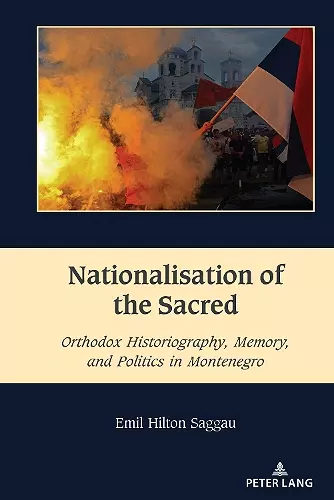Nationalisation of the Sacred
Orthodox Historiography, Memory, and Politics in Montenegro
Emil Hilton Saggau author Mihai Dragnea editor
Format:Hardback
Publisher:Peter Lang Publishing Inc
Published:26th Feb '24
Currently unavailable, and unfortunately no date known when it will be back

The Eastern Orthodox Churches in post-communist Eastern Europe are embroiled in long-running conflicts over ownership of territory, saints, sites, nations, and history. These often violent conflicts reflect political and national rivalries, most explicitly in former Yugoslavia and Ukraine. They are often understood as simplified ethnic-national tensions with religious overtones, but, as this book demonstrates such an assessment overlooks the deeper theological and historiographical framework.
Nationalisation of the Sacred offers a detailed analysis of the theological backdrop to these conflicts. It analyses how various strands of Eastern Orthodoxy have adapted to the contemporary political context, a process where history, memory, and politics are transformed to fit the needs of rival nations and churches. The book provides an in-depth analysis of this process and the transformations in church-related conflicts in post-communist Montenegro, where the Serbian Orthodox Church has been pitted against a rival Montenegrin church and Montenegrin government.
Additionally the book provides an up-to-date and unique analysis of Eastern Orthodox historiography, modern Serbian theology, religion in Montenegro more broadly, and the roots of the violent clash between Orthodox believers and the Montenegrin government in 2019-2021.
In this book, Emil B. Hilton Saggau delivers a very convincing and concise analysis of the Montenegrin Orthodox Church in the context of both Serbian Orthodoxy and Eastern European post-communist developments. He uses this case study to explain how ecclesiology, historiography, and national identity come together in various complex ways to shape modern politics. By focusing on Montenegro, he provides a corrective to many studies of the Serbian Church and politics, which are limited to internal developments and the link with the Yugoslavian wars. Moreover, Saggau's extensive knowledge of the theological background highlights another aspect often missing from treatments of religion and politics in the former Yugoslavia. Dr. Sebastian Rimestad, Senior Researcher in Religious Studies, University of Leipzig This book focuses on the theology-based ideologies and ideology-based theologies, which drive socio-political developments in the Western Balkans. The author does not stop there, however, and goes beyond, as far as to Russia and Ukraine. Wars and other conflicts in the Balkans and other areas, where peoples hold Eastern Christianity as their faith and identity, may look like isolated spots of violence, but in fact they constitute interconnected patterns. The author of the book connects many dots and explores these patterns thoroughly. He extracts from them what can be identified as a civil religion of political Orthodoxy — a peculiar amalgam of religion and politics that permeates both secularised and still religious societies in Southern and Eastern Europe. This is an indispensable guide to the minefields of the Eastern Christian theopolitics. Without such a guide, one can hardly comprehend the most recent wars, including the ones in the former Yugoslavia, Georgia, and Ukraine. Cyril Hovorun, professor of ecclesiology, international relations and ecumenism at Sankt Ignatios College, University College Stockholm, and director of the Huffington Ecumenical Institute at Loyola Marymount University in Los Angeles
ISBN: 9781433197413
Dimensions: unknown
Weight: 420g
220 pages
New edition